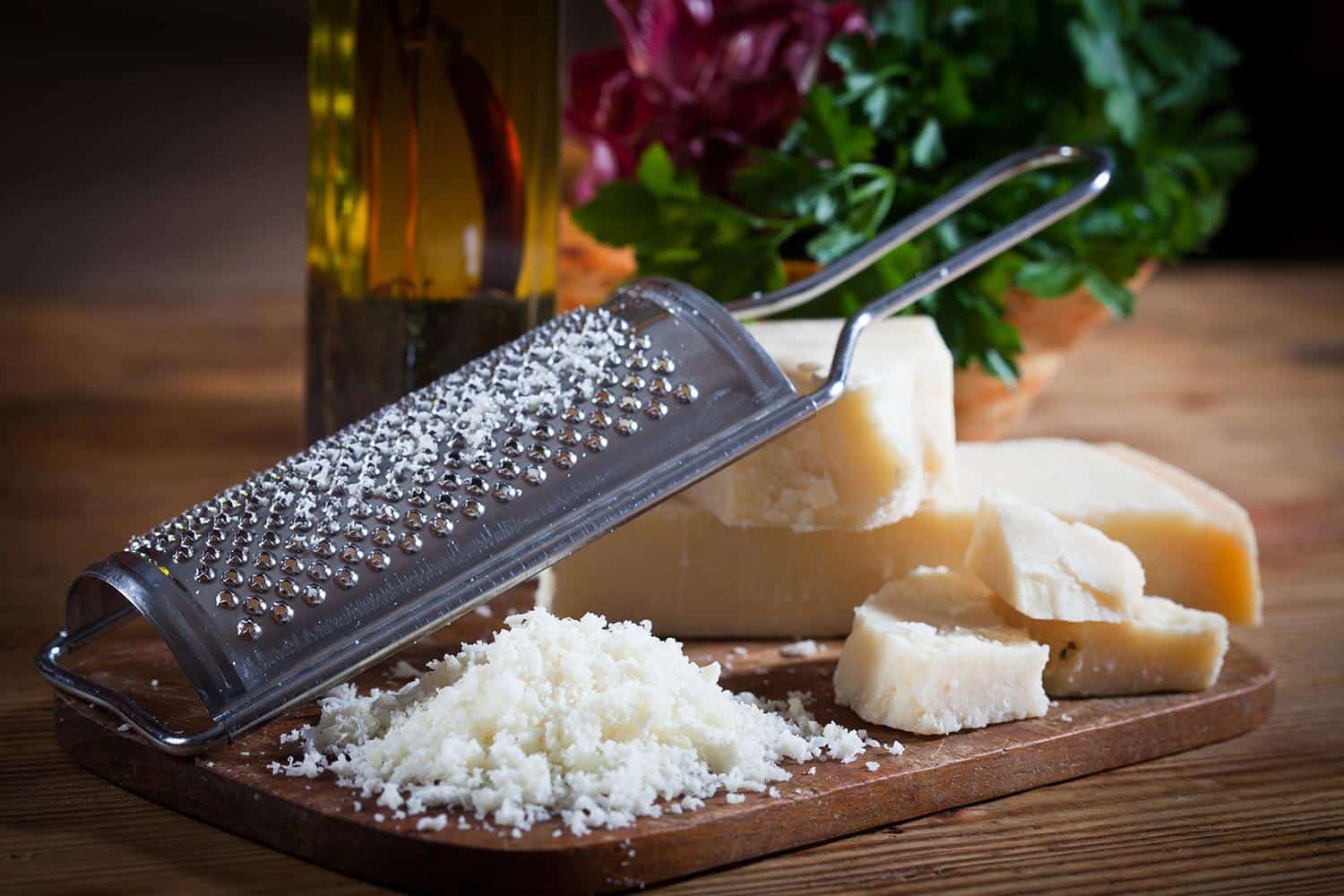Grating cheese can be a messy and time-consuming task. To save yourself time before the next meal, can you grate the cheese ahead of time and store it for later? Let's take a look to see if this is a viable option.
Yes! You can grate cheese ahead of time, store it in an airtight container, and put it in the freezer until you want to use it. However, grated cheese will last in the fridge for 1-2 weeks, but its quality will decline over time.
This is because grated cheese has more surface area, leaving it prone to air and oxidation, which will degrade the cheese taste and quality and lead to mold.
We agree that grating cheese ahead of time can be a time-saver. However, in this article, we will look at why grating cheese ahead of time isn't the best for optimal taste and quality. In addition, we will answer other frequently asked questions about cheese, so read on!

Can You Grate Cheese Ahead Of Time?
When you grate cheese, you essentially break it down into smaller pieces. This exposes more surface area to oxygen which will lead to a loss of flavor and a change in texture. Furthermore, grated cheese will dry out faster than a block of cheese.
If you decide to grate cheese ahead of time, we recommend that you store it in an airtight container in the freezer. This will help to prolong its shelf life. However, grated cheese will only last 1-2 weeks in the fridge before it deteriorates even with these precautions.
So, while you can grate cheese ahead of time, we don't recommend it if you are looking for the best flavor and quality. The difference between grating block cheese and shredded cheese in the store is how it's processed. Store-bought shredded cheese has preservatives that help to prevent it from drying out and losing flavor.
If you still want to grate cheese ahead of time, consider using a hard cheese like parmesan or cheddar, as it is less likely to change in texture and flavor when exposed to oxygen.
Parmesean is said to stay good for 10-12 months when stored in the freezer. That said, it's better to grate the cheese as it is needed rather than doing it all at once and storing it.

How Do You Keep Cheese Fresh In The Fridge?
There are a few ways to keep cheese fresh in the fridge:
- Wrap the cheese in wax paper or parchment paper.
- Place the cheese in an airtight container.
- Wrap the cheese tightly in cling wrap.
- Finally, store the cheese in the vegetable crisper drawer.
Doing any of the above will help keep cheese fresh for 1-2 weeks. After that, watch the cheese, and if you notice it drying out or developing mold, it is time to toss it.
Should I Shred My Own Cheese?

Pre-shredded cheese is more convenient, but it doesn't always taste as good. When you shred the cheese yourself, you can choose the type of cheese and how finely shredded you want it.
Since store-bought shredded cheese has preservatives doesn't always melt as well. So if you are looking for a creamy cheese sauce, it is best to shred the cheese yourself. In addition, you will get more bang for your buck when you buy block cheese versus store-bought shredded cheese.
While this is time-consuming and messy, you will be happier when you make that perfect mac and cheese using shredded cheddar that you did yourself.
Why Isn't My Shredded Cheese Melting?
Generally, there are a few reasons why your shredded cheese might not be melting. These include:
The Type Of Cheese
Hard cheeses like parmesan don't melt as well as softer cheeses. Try using a softer cheese like cheddar or mozzarella.
The Age Of Cheese
If the cheese is old, it might not melt as well. This is because cheese contains moisture, and as it ages, the moisture starts to evaporate, making the cheese dryer. Dryer cheese is more difficult to melt.
How A Cheese Is Shred
If you shred the cheese finely, it will have more surface area and melt faster. On the other hand, if you shred the cheese in big pieces, it will take longer to melt.
A Cheese's Fat Content
Cheeses with a higher fat content will melt better than low-fat cheeses. This is because fat helps hold the cheese together and prevents it from drying out.
The Quality Of Cheese
Store-bought shredded cheese has preservatives that prevent it from melting. However, as mentioned earlier, shredding the cheese yourself will give a creamier cheese sauce.
Too Much Heat
If your heat is too high, the cheese will burn instead of melting. Instead, try turning your heat down to a simmer and letting the cheese's moisture help melt it.
When melting cheese, remember it's a marathon, not a sprint. So go slowly and be patient and you'll have melted cheese perfection.

How Do You Make Shredded Cheese Melt Better?
Bring your cheese to room temperature before adding it to your roux for a more straightforward melting process. This will help prevent the cheese from drying out and make it easier to melt.
If you are having trouble getting your shredded cheese to melt, try using a mix of cheeses. Different cheeses have different fat contents, affecting how well they melt.
For a gooey, stringy cheese, use a mix of mozzarella and cheddar. If you are looking for a creamier sauce, try parmesan or gruyere.
You can also add a little bit of cream to help the melted cheese reach the desired consistency.

What Is The Best Way To Store Grated Cheese?
If you do shred too much cheese, then the freezer is the best way to store grated cheese in an airtight container. This will help to keep the cheese from drying out and losing flavor.
When you're ready to use the cheese, let it thaw in the fridge for 24 hours before using. You might find that the texture of the cheese changes slightly after being frozen, but it will still taste delicious.
While this is a viable option, don't be surprised if the texture will be affected. For example, freezing and thawing can cause the cheese to be crumbly.
So, if you are looking for a smooth texture, it is best to grate the cheese as you need it.
What Is The Best Way To Shred Cheese?
If you want to make your life easier when shredding cheese, you can use a food processor. Cut the cheese into smaller pieces and add it to the food processor fitted with the shredding attachment.
Pulse the cheese until it is shredded to your desired consistency. Be careful not to overdo it or end up with cheese powder.
If you don't have a food processor, you can put your block of cheese in the freezer for 30 minutes. The cheese will be firm enough to shred so it won't break off into chunks when grating.
Before grating the cheese, apply a cooking spray to the grater. This will help prevent the cheese from sticking and make cleanup a breeze.
Lastly, to avoid clumping, use the larger holes on the grater. Clumped cheese will make it tougher to melt evenly.
Does Shredded Cheese Contain Plastic?
Typically, when you look at the ingredients in store-bought plastic cheese, you will almost always see that it contains cellulose. Cellulose is a plant-based substance used to keep shredded cheese from clumping together.
While cellulose is considered safe, some people prefer to avoid it. If you want to prevent cellulose in your cheese, you can shred your cheese at home.
So no, shredded cheese doesn't have plastic, but it does have cellulose derived from plants.
You will notice that if you shred your cheese, it will start sticking together after a while. This is because there is no cellulose to prevent it from clumping.
If you want to avoid cellulose but don't want your cheese to stick together, you can add a little cornstarch. Just add a teaspoon of cornstarch for every 2 cups of shredded cheese.
To Wrap Up
Overall, if you would like to shred your cheese ahead of time, it is better to freeze it. However, keep in mind that the texture of the cheese will change slightly after being frozen.
If you are looking for a smooth texture, it is best to shred the cheese as you need it. This will prevent the cheese from drying out and becoming crumbly.
Like this article? Here are other posts on cheese:
What Cheese Goes On French Onion Soup?
How Long Can Cheese Last In The Freezer?
At What Temperature Should You Bake Mac And Cheese?



![Parmesan cheese layed on chopping board for slicing with greens on the side, How to Grate Parmesan Cheese Without a Grater [5 Options Revealed]](https://kitchenseer.com/wp-content/uploads/2020/04/Parmesan-cheese-layed-on-chopping-board-for-slicing-with-greens-on-the-side-1-250x250.jpg)

![set of cheese knives on a round wooden board. 14 Types Of Cheese Knives [Inc. What Cheese They're Good For And Why]](https://kitchenseer.com/wp-content/uploads/2021/07/set-of-cheese-knives-on-a-round-wooden-board.-14-Types-Of-Cheese-Knives-Inc.-What-Cheese-Theyre-Good-For-And-Why-250x250.png)
